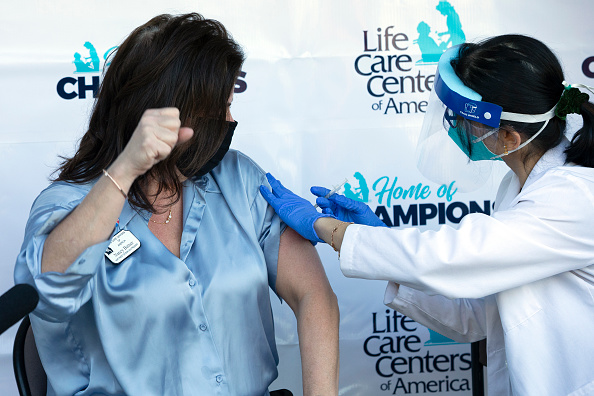In 2020, cardiologist and epidemiologist Peter McCullough, M.D. became one of the most vocal proponents of using safe, existing drugs to treat COVID-19. That approach was largely ignored in favor of a mass vaccination campaign using a genetic product with no more than two months of trial data. Health Care News spoke with McCullough at a recent health care summit in Michigan on the last two years and how to use what we have learned going forward.
Health Care News: A few months into the pandemic, you described how troubled you were government health agencies were so resistant to an early treatment approach in protecting people from the COVID-19 virus. You wondered if there was going to be a massive effort to push vaccines. You were right. Do you feel vindicated?
McCullough: The idea of a mass vaccine campaign seemed preposterous because we never mass vaccinate for illnesses, particularly during a prevalent pandemic. If we had an outbreak of staph, we would never put [every uninfected person] on antibiotics because it would invite resistant strains.
By the end of February 2021, 27 million people had taken the vaccine—far too many for a brand-new genetic product with no assurances they were safe. About 2.7 million people—nursing home patients and staff—should have received these new products, not millions, and very carefully. For genetic products such as these, we should have five years of safety data. Instead, we had two months.
Health Care News: People have certainly grown weary of the pandemic. At least one poll shows COVID-19 is at the bottom of the list of voter concerns. Fewer people are wearing masks and those who declined the shots don’t seem inclined to change their minds now—especially when shot proponents like Anthony Fauci and President Biden have been infected. Can we declare COVID-19 over?
McCullough: If you go on social media, and type in “#Covid is not over,” the people who use this hashtag are the same people who use “#vaccines work,” and “#get vaccinated.” So, there is this mindset out there that COVID is not over and it’s all about vaccines.
If vaccines worked, we wouldn’t need a hashtag that says vaccines work. Do we have a hashtag that says cars work? There are people out there who think COVID is not over or don’t want COVID to be over. They believe vaccines work and they want everyone to get vaccinated. But COVID has mutated to a point where it has basically become the common cold.
Health Care News: You had a close relationship with Dr. Vladimir “Zev” Zelenko, one of the biggest champions of early COVID treatment, who spoke out forcefully against the mass vaccine approach before he lost a long battle with cancer. Many people called him a freedom fighter. Do you agree?
McCullough: We did lose a freedom fighter. He lost his life early, and it was expected. He was also, in many of his statements, going for broke. He knew he had little time. He warned the world not to mass vaccinate with a brand-new genetic product that codes for the lethal Wuhan spike protein.
We are seeing record rates of life insurance claims among working people, largely working for employers who mandated COVID-19 vaccines. Record numbers! We have seen celebrity after celebrity become injured or die after getting the vaccine.
What has been interesting is the psychology. When people die, there is typically some kind of reaction, some kind of outrage, or some type of explanation. For instance, these deaths that occur in young people [are] now called “sudden adult death syndrome.” There is a death, there is no explanation behind it, typically. It’s like natural causes like they were found dead in their sleep.
People don’t naturally die in their sleep and we’ve seen this over and over again. The first one was Hank Aaron, and within a few weeks after getting the vaccine before cameras, he died. The press disconnects the two events, and that should tell you something.
Health Care News: How worried should the public be about censorship in medicine?
McCullough: There has been censorship in COVID-19 and the concern is this could spread to other diseases. In my book, Courage to Face COVID-19, [I discuss] the censorship in COVID applied by a group of stakeholders I call the biopharmaceutical complex. They include the Centers for Disease Control and Prevention (CDC), the National Institutes of Health (NIH), the U.S. Food and Drug Administration (FDA), the World Health Organization (WHO), the Coalition for Epidemic Preparedness Innovations (CEPI), the Global Alliance for Vaccines and Immunization (GAVI), the Gates Foundation, Wellcome Trust, and the vaccine manufacturers.
It’s basically a syndicate that has the mission of mass vaccinating the world with no exceptions—and it is in the open, that is what they want to do. There is no discussion about whether the vaccines can be safe or are working—that is censored. The false narrative is coming through that syndicate mechanism down through the medical literature, medical colleges, hospitals, health systems, doctors, and the media.
Health Care News: What can the public do to speak out against this?
McCullough: I think it can start in the physician’s office. If a doctor recommends the COVID-19 vaccine, the patient should say they researched the topic, and they just don’t feel safe taking it. I want that doctor to hear it from a patient because the vast majority of doctors took these [shots]. Once someone takes the vaccine, they figure, if I took a risk, the next person needs to do the same. It is up to the patient to break that cycle.





















